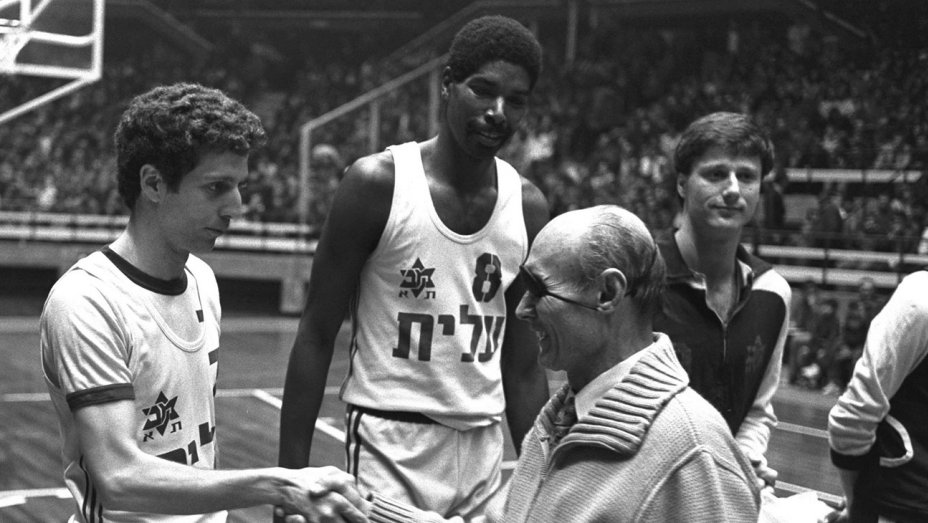“On the Map” Details the Road to Glory
 By Avi Lerner
By Avi Lerner
There are some events so important that people will always remember where they were when they occurred. Kennedy’s assassination, the first moon landing, the fall of the Berlin Wall, and, most recently, the attacks of 9-11 come to mind as some of the most iconic events in world history over the past 60 years.
There are some events in the world of sports that evoke the same feelings. Every American who was alive in 1980 probably remembers that year’s “Miracle on Ice” in which the US Olympic Hockey Team beat the Soviet Union, an amazing event which occurred against the backdrop of the Iranian hostage crisis and the Soviet invasion of Afghanistan.
But, for my money, there is an even greater story than that American triumph. It is the more improbable and, in the grand scheme of things, more historical story that details the point at which an entire nation stopped for one team: In 1977, Israel’s Maccabi Tel Aviv Basketball Team won the European Cup, stunning not just the CSKA Moscow team, but also the teams from Real Madrid and Mobilgirgi Varèse, Lombardy’s professional basketball club. Israel won a tournament that literally put the Jewish state on the map.
The documentary, “On the Map,” by Dani Menkin, is the incredible true story about how the Tel Aviv team no one thought could win toppled the four-time defending European Champions and put Israel firmly on the map. It takes its title from a remark made by the team’s captain, Tal Brody, after the victory: “Israel is on the map, not just in sport, but in everything.” It became a rallying cry for the whole country.
After National Tragedies
The timing of the tournament could not have been more crucial. Israel had just experienced the 1972 massacre of its Olympic athletes in Munch, the 1973 Yom Kippur War (in which nearly 2,800 young Israelis died), and the 1976 plane hijacking that led to Jerusalem’s successful raid on Entebbe.
The documentary features not just interviews with the basketball players, but also with the commentators, many of whom had connections to the Yom Kippur War and the Munich Massacre.
The Israeli team, consisting of quite a few American players, led by Jewish-American Tal Brody, as well as some Israeli upstarts, played sufficiently well to advance to the 1976-1977 FIBA European Championship. It was a position they had achieved before, but never beyond the first round.
A Different Year
The year 1977 would prove to be different. Maccabi Tel Aviv took on Real Madrid on the Spaniards’ home turf and won. Israel then proceeded to face CSKA Moscow, who agreed to play only in a small neutral town in Belgium. Tel Aviv defeated the Soviets, and then, because the Soviets had also been crushed by the Mobilgirgi, Israel advanced to the finals. Their opponent in the finals was the same Mobilgirgi, a team that had defeated them once before in Israel.
Maccabi Tel Aviv, a team no one believed would make it into the second round, found itself on the precipice of winning the entire tournament.
And then there was a near disaster. Just before the championship game in Belgrade, Tal Brody felt compelled to fly home to America. His father had suffered a heart attack. But his father would have none of it. He told his son to return to his team and help them win the championship of their lives. Tal Brody returned to Belgrade just in time. In a marvelous nail-biter, Maccabi Tel Aviv triumphed over Mobilgirgi.
It Was That Important
The importance of the Israeli victory cannot be overstated. Then-Israeli Prime Minister Yitzchak Rabin, who was scheduled to resign on the night of the final tournament, delayed his resignation until the game was over. It was that important. The entire country came to standstill, just so Israelis could witness their team’s attempt to accomplish the unimaginable. It was unheard of before or since. The national celebration, which was rampant and joyous, is believed by many to have been the impetus to inspire the country to even greater heights in the ensuing years.
There is no denying that 1977 was a watershed year for Israeli sports. Maccabi Tel Aviv’s title appearance and victory led to 14 more appearances and six championships over the next 39 years. Tal Brody and his teammates, Aulcie Perry and Jim Boatwright, became cherished national treasures in Israel’s sports history, a legacy that continues to this day.
Although there have been many celebrations of sports victories in Israel since that European Cup, the first is always the most memorable. Tal Brody and the 1976-1977 Maccabi Tel Aviv team truly put Israel “On the Map.”





